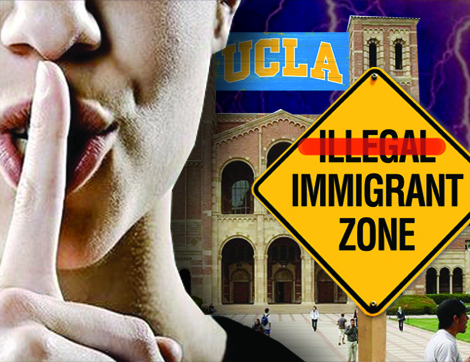
• Conservative, Christian, politically incorrect students being targeted by thought police
By Keith Johnson
Young, constitutionally-minded American students are on the front-lines of an ongoing battle to preserve our cherished First Amendment right to speak freely on college and university campuses across the nation.
For far too long, administrative speech codes and arbitrary school policies have been used to silence students with conservative or Christian viewpoints while their more liberal counterparts are not only given a free pass, but are also allowed to participate in the silencing process.
On August 26, the undergraduate student government at the University of California-Los Angeles (UCLA) unanimously passed a resolution “calling for the end of the use of the phrase ‘illegal immigrant,’ saying it violates human rights guaranteed by the U.S. Constitution,” according to college investigative group Campus Reform.
In other words, liberal students, with no real-world legal experience, are now extra-judicially interpreting the Constitution and creating their own laws, which can then be used to punish the minority of student activists fighting to stem the tide of illegal aliens flooding across U.S. borders.
While the UCLA resolution remains to be challenged, students elsewhere are taking a stand against these constitutionally restrictive policies.
VIDEO: Student Banned from Passing Out Constitutions on Constitution Day at Modesto Junior College
In Ohio, Christian advocacy group Alliance Defending Freedom (ADF) recently filed suit against Columbus State Community College for violating the constitutional rights of Spencer Anderson, a student who was restricted from handing out fliers for a pro-life club he wanted to start on campus.
“The college has a policy restricting when and where students can speak,” said ADF senior legal council David J. Hacker during a recent interview with this AMERICAN FREE PRESS reporter. “Our client had to get permission 48 hours in advance and was then assigned to one of two very small ‘speech zones.’”
Hacker went on to say that college officials forbade his client him from exiting the speech zone, which, according to the complaint, measures a mere “800 square feet” and “occupies approximately 0.02%” of the college’s 80-plus acre campus.
“This is a very onerous restriction on free speech,” said Hacker. “It’s unacceptable for the marketplace of ideas. We should be encouraging students to speak and get each other involved in activities rather than stifling them.”
At the same time limitations were being placed on Anderson’s activities, other student activists were allowed to roam freely about the campus.
“My client has watched two other groups promoting their causes outside of these speech zones,” said Hacker. “One was handing out fliers for People for the Ethical Treatment of Animals and the other for a student diversity issue.”
When asked to cite another example of this kind of discrimination, Hacker replied: “We had a case at the University at Buffalo, where a pro-life student group wanted to hold a debate on the morality of abortion. They went so far as getting the proper reservations for a classroom and setting up the event before being told [by school officials] that they needed to have university police present. They were essentially forced to have this security, despite any evidence of an anticipated disruption, and pay [campus police] over $650 out of their own pockets. Meanwhile, an atheist group was holding a debate in the same building and there was no security.”
Although stories like this are disturbing, many have been resolved in favor of the persecuted student thanks to Hacker and his organization.
“[ADF] has litigated many cases over the years that have resulted in major victories,” said Hacker. “We were one of the first to bring a “speech code” case before the U.S. Court of Appeals and ended up winning [on behalf of the plaintiff] against Temple University.”
Hacker continued: “In California, we represented a group of students who challenged a very oppressive speech code that applied to every state-run campus. We ultimately had that struck down and liberated half a million students on 23 campuses.”
Despite these victories, Hacker said that there is much work left to be done, and that those fighting to protect free speech on campus will face a major challenge in the months ahead thanks to the federal government.
“After investigating a sexual harassment case at the University of Montana, the Departments of Justice and Education have come up with a sexual harassment “blueprint” for colleges and universities throughout the country,” said Hacker. “If a female simply didn’t like what a male student said, she could report it and that student could be punished.”
Hacker went on to say that the blueprint, which would apply to every college receiving federal funding, gives such a broad definition of sexual harassment that it could be used to prohibit all manner of speech.
“This will give administrator’s unbridled authority to interpret speech and decide if it’s offensive,” said Hacker. “Unfortunately, what we’re seeing is that all too often, it’s the Christian, conservative and pro-life students who are accused and punished for so-called ‘offensive,’ speech.

Keith Johnson in an investigative journalist and creator of the Revolt of the Plebs.

